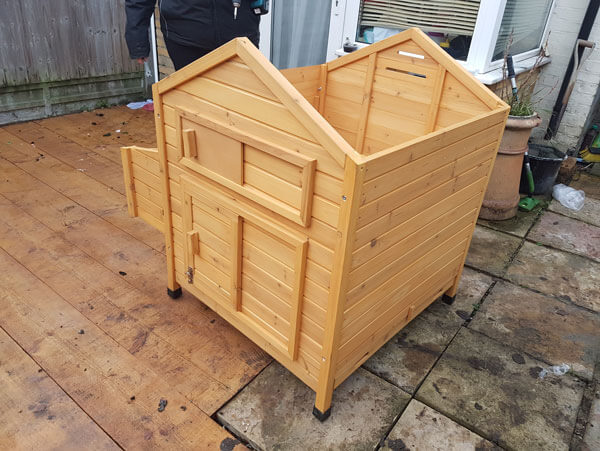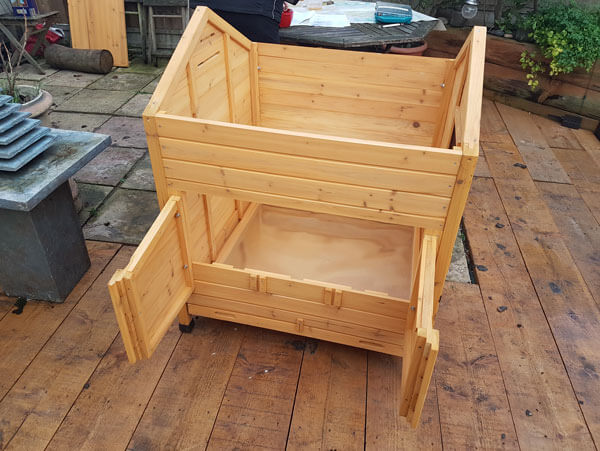To keep chickens happy and healthy, they need the protection and shelter of a chicken coop to sleep and to lay their eggs.
Available in almost any shape and size, chicken coops or sheds can be as basic or extravagant as you please. They can either be tucked away in the corner of the garden or painted any colour to make them a ‘stand-out’ feature of the garden.
Chicken Coop Costs
Chicken coops or sheds can be as cheap or expensive as your budget allows with coops starting from around £80 and going in to the hundreds. Cost is usually based on the size of the chicken coop, the type of materials used and the quality of the construction.
Types of Chicken Coop
Traditional chicken coops are usually made from timber and are available in an array of sizes. In terms of style, they are available in both traditional and modern styles. A compact chicken shed can usually accommodate around 2 to 4 birds whilst grander chicken sheds and coops can accommodate around 8 to 10 birds. Some manufacturers now supply plastic alternatives alongside their traditional wooden coops.
Chicken Coop Assembly
Most wooden chicken coops come as flat pack kits and are easily assembled with a few screws and bolts. Don’t worry as most are generally easier to put together than flat pack furniture and are supplied with clear, easy to follow instructions. Before constructing your chicken shed we recommend that it is first treated with 2 coats of wood preservative and an exterior wood oil. Alternatively, a garden paint suitable for sheds and other garden structures is a great way to add colour and character to your chicken coop. Doing this prior to assembly means that all the edges and difficult to reach areas can be treated prior to construction. If well maintained, a flat-pack chicken coop will last significantly longer than an untreated one.


Chicken Coop Care
The best way to prolong the life of your chicken coop is to treat the wood thoroughly, if possible, before construction, with a shed preservative and oil-based shed treatment or other exterior wood oil.
Are wood preservers and treatments safe for chicken coops and sheds?
Although wood preservatives are designed to kill mould, algae and wood boring insects, they are perfectly safe for chicken coops and other animal enclosures once fully dry. Coating the preservative with an exterior wood oil for decking. This will seal in the preservative and provide excellent weatherproofing protection to the coop.
Our recommendation is to treat all sides, inside and out plus edges and end grain with 2 coats of wood preservative. Once these have fully dried, 2 coats of an exterior wood oil. Using a clear or coloured decking oil is a great way of sealing and protecting the wood from weathering and water ingress, as they are highly durable and weather resistant.
We recommend that once or twice a year, all external facing surfaces are given a maintenance coat of exterior wood oil to top-up the weather protective surface. Spring and early autumn are the ideal times to do this.
Where to Buy a Chicken Coop
Chicken coops are available from a range of pet stores and specialist online retailers. When looking to buy a chicken coop, it’s worth reading the coop or shed descriptions to find out what features and/or guarantees it has along with details of materials used for construction. Chicken coop reviews posted by customers who have already bought and are using their coops can also be a great source of information.
An alternative to buying a chicken coop is to build your own with reclaimed pallets or pieces of wood. This has the benefit of being able to make your chicken shed any shape or size that you want, but when factoring in time and the costs of screws, nails, tools and chicken wire, may not be as cheap or economical as first thought.
Chicken Runs and Enclosures
If having chickens running freely around the garden isn’t for you, the natural accessory for the chicken shed or coop is the chicken run. These normally take the form of runs that attach directly to the chicken shed or the bigger enclosure types, that totally enclose the chicken house and an area around it.
As with chicken coops, the cost of these runs vary depending on size, type of construction and materials. If chickens don’t have free reign of the garden, a good sized chicken run is essential for the health and well being of your chickens.
